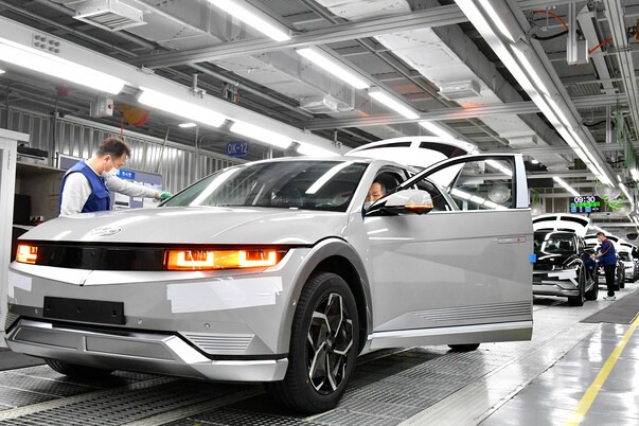Electric vehicles
Hyundai Motor to boost EV leasing in US for tax credits from 2023
The carmaker is aiming to raise the lease to 30% of entire EV sales in the US; Korea will discuss with the US regarding tax benefits with battery minerals from Indonesia and Argentina
By Dec 30, 2022 (Gmt+09:00)
2
Min read
Most Read
LG Chem to sell water filter business to Glenwood PE for $692 million


Kyobo Life poised to buy Japan’s SBI Group-owned savings bank


KT&G eyes overseas M&A after rejecting activist fund's offer


StockX in merger talks with Naver’s online reseller Kream


Mirae Asset to be named Korea Post’s core real estate fund operator



South Korean electric vehicles for lease are forecast to receive US tax credits under the Inflation Reduction Act (IRA) as new guidelines of the law, released on Dec. 29, expand the list of cars that qualify for the maximum $7,500 tax benefit per unit.
According to the IRA fact sheet that the US Internal Revenue Service (IRS) issued on Thursday, the list of "qualified commercial clean vehicles" for the tax benefits added cars acquired for use or lease by the taxpayer and not for resale.
Hyundai Motor Group, which owns Korea's two largest automakers, Hyundai Motor Co. and its affiliate Kia Corp., is planning to boost the lease from 5% to 30% of entire EV sales in the US. The group will use part of its existing plants to produce electric cars for rental.
"The new guidelines of IRA will play a decisive role for Hyundai Motor Group to increase EV exports to the US for a while," said Yoo Ji-woong, automotive equity research analyst at Daol Investment & Securities Co.
The Korean government and Hyundai Motor Group have requested the US government give Korean carmakers a three-year grace period before applying the clean car tax credit law to their EVs sold in the US.
In November, Korea's Ministry of Trade, Industry and Energy sent a letter to the Treasury and asked the US to ease the rules and expand the scope of cars assembled in the US to include vehicles partially manufactured in the country.
The Korean ministry also said eco-friendly cars purchased for rental or lease should be considered eligible for tax incentives.
Hyundai Motor broke ground on a $5.54 billion EV and battery plant in the US state of Georgia in October. The carmaker is aiming to begin the plant's commercial operation in 2025 with an annual production capacity of 300,000 EV units.
NOT APPLICABLE TO FINAL ASSEMBLY OUTSIDE NORTH AMERICA
The new guidelines are not fundamental solutions for the Hyundai and Kia EVs assembled in Korea, industry sources said.
Under the act that took effect on August 16, a new clean vehicle must have had its final assembly in North America to be eligible for the credit. The IRA fact sheet reconfirmed that North America includes the US, Canada and Mexico for purposes of determining the final assembly location.
The Korean carmakers are hopeful that IRA will include more countries for critical minerals used in EV batteries. Under the current law, the US demands at least 40% of battery minerals be included in EVs from 2023. To be eligible for the tax credits, the minerals should come from the US or its free trade partners.
The US government said in the fact sheet it will issue proposed critical mineral and battery component guidelines later in 2023.
The Korean trade ministry is set to negotiate with the US to add key battery material exporters to Korea, such as Indonesia and Argentina, to the list under the new guidance.
Write to Han-Shin Park, Hyung-Kyu Kim and In-Seol Jeong at phs@hankyung.com
Jihyun Kim edited this article.
More to Read
-
 Business & PoliticsKorea, Hyundai Motor request 3-year reprieve on US EV tax credit law
Business & PoliticsKorea, Hyundai Motor request 3-year reprieve on US EV tax credit lawNov 04, 2022 (Gmt+09:00)
2 Min read -
 BatteriesSK On inks lithium deal with Australian firm for US tax credit
BatteriesSK On inks lithium deal with Australian firm for US tax creditSep 29, 2022 (Gmt+09:00)
3 Min read -
 Electric vehiclesEV tax credits may prove detrimental to the US: EU official
Electric vehiclesEV tax credits may prove detrimental to the US: EU officialSep 22, 2022 (Gmt+09:00)
2 Min read -
 Electric vehiclesKorean PM Han says EV tax credits may violate FTA rules
Electric vehiclesKorean PM Han says EV tax credits may violate FTA rulesSep 21, 2022 (Gmt+09:00)
1 Min read -
 BatteriesFord CEO heads to Korea to discuss EV tax credit with LG Energy, SK On
BatteriesFord CEO heads to Korea to discuss EV tax credit with LG Energy, SK OnSep 16, 2022 (Gmt+09:00)
3 Min read
Comment 0
LOG IN


